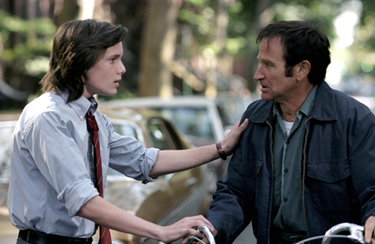|
Reviews of Recent Independent, Foreign, & Documentary Films in Theaters and DVD/Home Video
HOUSE OF D
Every once in awhile a coming-of-age story rises above
its genre. Many, however, are just sappy, filled with sentimental clichés. Cult star David
Duchovny's
first foray into big screen writing/directing, House of D, falls
somewhere in between.
In bookends set in the present day, artist Tom Warsaw
(Duchovny) relays for the first time his life story to
his French wife on their son's 13th birthday, the same age
Tom feels he became a man and, as he puts it, stopped
feeling.
Back in crime-free New York,
1973, young Tom (Anton Yelchin), a few weeks before he
turns 13, lives with his
emotionally unstable widowed mother (played by Duchovny's wife Téa
Leoni). He works delivering meat with his best friend, the school's
retarded (and they do call him that) assistant janitor Pappas (Robin Williams). And of course
there’s the first love, first kiss, first
heartbreak, etc. Tommy even
gets a muse, Lady (Erykah Badu), a convict in solitary confinement at
the Greenwich Village Women's House of Detention (where the movie gets its name). Sight
unseen, she offers Tom words of wisdom from her window.
Performances across the board are surprisingly good. Yelchin gives a
proper balance to a character on the border of childhood and adulthood,
though more easily on the side of the former. Robin Williams, though
at times grating with his typical shtick, is for the most part subdued. Most surprising is Tea
Leoni, who actually gives a
realistic performance - a welcome change from her over-the-top
take in last year's mess Spanglish.
Duchovny adds a few little details
that really do help give the film character, even if House of D itself
does not completely rise above the clichés (Lady has all the answers) or its flimsy story line.
That Tommy goes to a Catholic school and
the head priest (Frank Langella) isn't a pedophile but a nice guy is a welcome
change. Though the characters aren't psychologically rich and
deep, their simplicities make them more realistic.
There are times when the film gets far too sappy for its own
good - the final act is unnecessarily long and suffers the most from
this - but for the most part it avoids falling into melodrama. Brett Harrison Davinger
|
